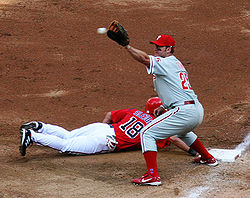.gif)
Safe (baseball)
Encyclopedia

Baseball
Baseball is a bat-and-ball sport played between two teams of nine players each. The aim is to score runs by hitting a thrown ball with a bat and touching a series of four bases arranged at the corners of a ninety-foot diamond...
, a baserunner is safe when he reaches a base without being put out
Out (baseball)
In baseball, an out occurs when the defensive, or fielding, team effects any of a number of different events, and the umpire rules a batter or baserunner out. When a player is called out, he is said to be retired...
by various ways. While a runner is touching a base, he is usually not in jeopardy of being put out, and is thus "safe" from fielders actions. The runner is in jeopardy once again, negating this safety, when he ceases touching the base, when forced on a force play
Force play
In baseball, a force is a situation when a baserunner is compelled to vacate his time-of-pitch base—and thus try to advance to the next base—because the batter became a runner. A runner at first base is always forced to attempt to advance to second base when the batter becomes a runner...
, or when the runner commits interference
Interference (baseball)
In baseball, interference is an infraction where a person illegally changes the course of play from what is expected. Interference might be committed by players on the offense, players not currently in the game, catchers, umpires, or spectators; each type of interference is covered differently by...
.
By the rules, a runner is safe when he is entitled to the base he is trying for. Umpires will signal that a runner is safe by extending their elbows to their sides and then extending their arms fully to the side. For emphasis, an umpire may fully cross and extend his arms several times to indicate safe. Verbally, the umpire will usually simply say "safe". If a close play occurs that may have appeared to be a putout
Putout
In baseball statistics, a putout is given to a defensive player who records an out by one of the following methods:* Tagging a runner with the ball when he is not touching a base...
, the umpire will also call a reason for the safe call, such as "he dropped the ball" or "he missed the tag".

